Trusting God for the Future
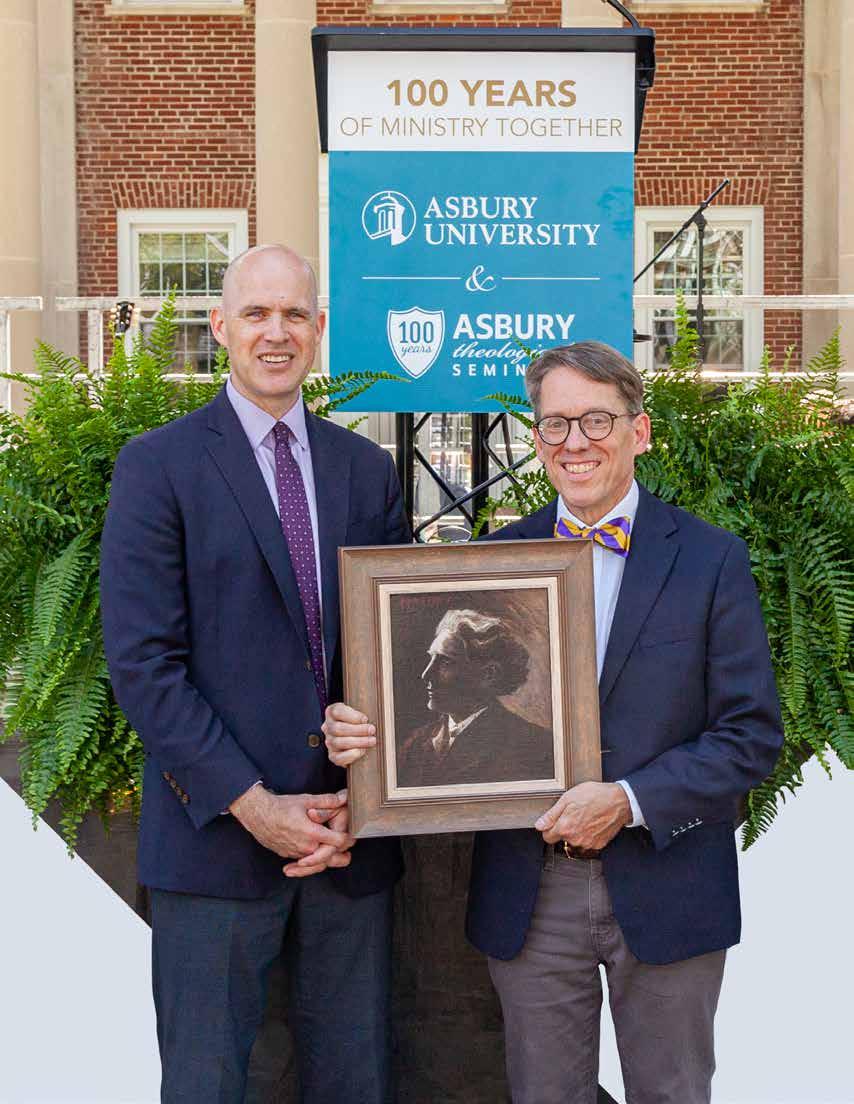
Vol. 141 no. 1 Spring/Summer 2023
3. Letter from the President Trusting God for the Future
4. The Future of Church Leadership Anthropological Perspectives from Dr. Sue Russell


6. 3 Key Strategies for Effectively Reaching Gen Z

Dr. W. Jay Moon Professor of Church Planting and Evangelism
8. The Future of Protestantism in Hispanic America

Dr. Danny Román-Gloró Director of the Asbury Latino Center
10. Asbury Seminary Launches Innovative Master of Divinity+ (M.Div.+)

Jenny L. Burkhart, Associate Vice President of Enrollment Services
12. Alumni Highlight: Rev. Chad Brooks

Pastor, Church Planter
Master of Divinity, Asbury Seminary, 2011.
13. Alumni Highlight: Rev. Dr. Daniel Ronda
President of the Christian and Missionary Alliance Church in Indonesia


Doctor of Ministry, Asbury Seminary, 2007
14. Alumni Highlight: Pam Harrison
Founder, High Seas Ministries
M.A. in Theological Studies, Asbury Seminary, Graduating 2024
18. Reflections on the Outpouring
Dr. Thomas McCall
Timothy C. and Julie M. Tennent Chair of Theology
20. Voices of the Presidents
22. News and Events
800.2ASBURY asburyseminary.edu The Asbury Herald is published in electronic format (asbury.to/herald) to reduce paper consumption and increase access. Please visit this site to learn how to access the electronic version on your Apple or Kindle device. Go green! try our e-edition POSTMASTER: Please send address changes to The Asbury Herald, Asbury Theological Seminary 204 N. Lexington Ave., Wilmore, KY 40390-1199
4 6 8 10 12 13 14 18 20
23. Joint Worship Service with Asbury University
asbury theological seminary Publisher dr. timothy c. tennent Editor in Chief
Asbury
for
Find this 2023 Spring/Summer Herald, previous editions of The
Herald,
resources online at asburyseminary.edu or e-mail communications.office@asburyseminary.edu
christine senak Managing Editor wes wilcox Graphic Design audrey wagner Staff Writer
Theological Seminary is a religious, not-for-profit, educational institution, which has long enjoyed the benefit of estate stewardship of many friends. If you are considering a bequest, please use our full legal name and address: Asbury Theological Seminary, 204 N. Lexington Avenue, Wilmore, KY 40390-1199 or call
800.2ASBURY
specific information.
Asbury
and other Asbury Seminary
TRUSTING GOD FOR THE FUTURE
The theme for our Centennial Celebrations is “Thanking God for the Past; Trusting God for the Future.” We dedicated the first part of our Centennial Celebrations to remembering the faith and courage of those who started Asbury Seminary and those who kept it faithful for our first one hundred years. We were built on the foundation of our faith in Jesus Christ and the gospel, our commitment to God’s Word, and our strong emphasis on sanctification and holiness. As the calendar turned to 2023, we began to pivot our celebration toward the future and anticipate all that God has planned for our next centennial of service.
The centerpiece of this transition is our new strategic plan, known as the Centennial Plan. This will be our roadmap for the years ahead. Asbury Seminary will continue to build on the faithfulness of our strong heritage but will be extending even more in service to the global church. For the first time in our history, we are partnering with schools in Latin America, Europe and Asia to offer degrees and to strengthen the church around the world. We have launched our Asbury Latino Center to better serve the growing Hispanic church. Our fastest-growing degrees are now our bilingually delivered D.Min. and Master’s degrees. We have also launched our Center for Church Multiplication. This center will build on our earlier commitment to church planting. During the previous Strategic Plan, we trained 1,000 new church planters. We will now actively come alongside churches with a goal to plant 1,000 new churches through our network. We will provide financial support for new church plants, helping church multiplication by providing experienced coaches with seasoned advice and strategies. We will provide a series of masterclass videos to multiply the training of new church planters here and around the world. In short, we are beginning to step fully into the implications of our founding mission statement to “spread scriptural holiness throughout the world.”
Most of you are aware that in February we experienced a dramatic spiritual awakening in Wilmore. It began February 8 in Hughes Auditorium on the campus of Asbury University. After a normal chapel service, most of the students left for their classes, but a few stayed behind for worship and confession of sins. Gradually, more and more students returned until Hughes auditorium was filled, clearly revealing a move of God in their midst. Over the next sixteen days, worship and prayer never stopped. Hundreds and then thousands began to come for renewal and awakening. The center of the move of God was the awakening of Generation Z (young people up to 25 years
old). This generation has been strapped by hopelessness, and quite dramatically they discovered new hope in Jesus Christ. Many were delivered from hopelessness. Many came to the Lord. Countless people confessed their sins and found new freedom and forgiveness. Eventually, tens of thousands began to pour into the city. Asbury University wisely focused on the Gen Z youth who were pouring into the city as well as those in their own student body. Asbury Seminary became the primary host for the other visitors. We opened Estes Chapel, then McKenna, then Cowen, then our gymnasium and even our cafeteria as places for ministry. Each of these places was filled with prayer teams and altars. Day and night we had teams praying for those who were streaming to the altars.
This is at the heart of what we mean by “Trusting God for the Future.” God is stirring His people in fresh ways. Our culture is broken. Our families are broken. A deep malaise shrouds our whole country. Today, there is hope. Today, we have again been reminded of why we were founded one hundred years ago: to spread scriptural holiness throughout the world. I have never been more hopeful about the future of the church than I am now.
It is, of course, wise and appropriate that we follow strategic plans as we think about our future. But we must also remember that, in the end, the future of the church as well as of the Seminary is about the sovereign work of God in our midst. We must always be prepared to receive a fresh encounter with the Lord of the church. We must always be prepared for Him to show us pathways into our future that we never thought of or planned for. I told our students in the midst of the revival that it is a miracle whenever someone is dramatically met by God at an altar, dripping with tears and confession. It is also a miracle when students come to a seminary like Asbury and take classes, learn biblical languages, study theology and so forth. The former is a miracle. The latter is also a miracle; it is just a miracle in slow motion. As Asbury Seminary pivots to our next 100 years, we must always be a faithful steward of both miracles. With this commitment, the future is as bright as the promises of God.
Dr. Timothy C. Tennent President, Professor of World Christianity
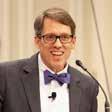
Spring/Summer 2023 ∙ herald 3
LETTER FROM THE
PRESIDENT
THE FUTURE OF CHURCH LEADERSHIP

IFyou want to know what marginalized, minority and multinational communities offer the global church, learn from trained anthropologist and New Testament scholar Dr. Sue Russell, who has studied and lived in different cultures for over 30 years.
She explains to her “Missional Formation” students that these groups give us perspectives and reveal blind spots in our thinking. “Our culture puts blinders on us. Every culture has mental schemas by which we sort data. So, our brain has filters based on our cultural presuppositions. We filter all our data through them.”
Dr. Russell proposes a simple cure: listening to voices from other cultures. “We need people who are different than ourselves; otherwise, we’re just listening in an echo chamber,” she explains. Specifically, we need stories. “When we hear people’s stories, people are no longer identified by a group but as a person. When we categorize people in groups, it’s dehumanizing… by hearing stories, we begin to have more empathy, more understanding.”
PEOPLE VERSUS TASK
When attempting to build community, sensitivity to differing cross-cultural perspectives is imperative. One of these is people versus task. In cultures that value relationships over tasks, “you can’t just go in with a to-do list,” Russell says. “Drink coffee, eat a rice meal, drink some more coffee, then we can talk about things.” Meetings are not just business meetings but are often to reinforce relationships and build trust. In such cultures, it is about “doing the task so we can be together, instead of getting together so we can do the task.”
POSSIBILITIES VERSUS PROBLEMS
Appreciative inquiry is also recommended when studying cultures. This means looking at possibilities instead of problems. “You can’t study what people aren’t doing,” Russell points out. “So study what they are doing and find out why they’re doing it.” If a group is resistant to the gospel, the reasons may be embedded in their practices,
Anthropological Perspectives from Dr. Sue Russell
community and identity, rather than in simply holding false beliefs. Practices like magic fulfill a purpose in a culture, for example. A spirit of inquiry digs in to find out why.
IT'S NOT ABOUT ROLES
Even the gender-role debate in the church finds altered perspectives when heard through cross-cultural voices. While teaching in the year 2000 at a United States Evangelical college, Russell found that both sides of the egalitarian versus complementarian debate were based on Western, particularly North American, biases and assumptions.
These assumptions include looking for roles and structural alignment in Scriptures that are not speaking about these. “There is never a prescriptive in Scripture for roles,” Russell says.
Egalitarians say there is no hierarchy, and complementarians are hierarchical. Their two perspectives, referencing Galatians 3:27-28 versus Ephesians 5:22-33, both miss the point of these Scriptures. “Scriptures are not reinforcing hierarchy,” Russell explains. Rather, “God is showing us how to live mutually within that hierarchy and transform it for service and inclusion, not dominance and exclusion.” Russell says the real questions are this: “Can you have mutuality within those cultures with hierarchy? Can you use that hierarchy to serve?”
BECOMING EQUAL
True mutuality requires that interdependency that Westerners don’t like, according to Russell.
She spent 17 years working with Wycliffe Bible Translators in Southeast Asia, working with the Tagal church to translate the Bible in their language. She learned to put tasks on hold and build relationships, following the Tagal initiative and timing for different projects such as literacy, evangelism, and church planting. She observed Tagal Christians pray every step of the way when they
were asked to burn items from a pot of black magic, showing their continual reliance on God. When translating 1 Corinthians 13, she learned that “love” in the Tagal language cannot be an abstract noun but must be a verb requiring a subject and an object: “Someone who loves another is kind,” and, “Someone who loves another is patient with them.” The Tagal people and language remind us that “the fruit of the spirit is not about me; it’s about the quality of our relationships,” says Russell. “The identity marker of Christians is how we treat people.”
In the field of anthropology, power is identified with social value. To create equality in the global church, therefore, we must value voices from other cultures. “Until we value what the other person brings to the partnership, we won’t be equal,” Russell explains.
BEING A FAMILY
Furthering her point, Russell once studied a large multicultural church in California that exhibits this partnership. At this church, the congregation sees themselves reflected in their group of ministry leaders regarding gender and heritage. She says that young people want collaborative and diverse leadership rather than “stars;” they want authenticity and a voice; they want the church to come alongside them and support what its members are doing.
The word that Tagal people use for their relatives is the same word they use for their church members. “How do we go from being institutional to being a family?” Russell asks. “Wouldn’t it be cool if we once again saw the church as family rather than an institution?”
Voices from cultures across the globe would surely answer with a resounding yes.
Dr. Sue Russell is the Professor of Mission and Contextual Studies at Asbury Seminary. Prior to coming to Asbury, Dr. Russell worked at Biola University and spent 17 years in cross-cultural ministry and field research with Wycliffe Bible Translators in S.E. Asia.

Spring/Summer 2023 ∙ herald 5
“When we hear people’s stories, people are no longer identified by a group but as a person. When we categorize people in groups, it’s dehumanizing… by hearing stories, we begin to have more empathy, more understanding.”
Key Strategies for Effectively Reaching Gen Z
 by Dr. W. Jay Moon
by Dr. W. Jay Moon
for the last eight years, Asbury Seminary and Knox Fellowship have hosted an eight-week practical evangelism seminar (free to Asbury Seminary students) to learn both the complexities and opportunities in reaching Gen Z.
Here are three key strategies we discuss and practice in this course to effectively reach Gen Z today:
1. Stop talking and start listening. Evangelism starts with this simple action. Drop the formulas and assume the posture of a listener. God is having a conversation with everyone that you meet, even if they are not aware. Your role is to catch up on that conversation and keep it moving toward Jesus. The difference between being heard and being loved is almost indistinguishable. One way to demonstrate love for Gen Z is to practice empathic listening.
“Evangelism just doesn’t work today!” a student told me.
“When I explained the Four Spiritual Laws to my friend, he just looked at me like I was crazy. Maybe others are gifted in evangelism, but certainly not me!”
If you’ve had a similar experience, you’re not alone. Instead of using 20th century evangelistic approaches in 21st century culture, we must contextualize our approach to effectively reach others with the gospel. Every semester
2. Learn to ask good questions. Now that you are listening, demonstrate love to the individual by asking good questions. In a culture so consumed with self, caring about someone enough to ask good questions can be truly revolutionary. It sounds simple, and it is. All it requires is your time, attention, and the heart of Christ for the person you are conversing with.
3. Speak God’s message into the struggle. Instead of starting with a pre-formed message, tell God’s truth to
Evangelism is particularly challenging when it is not contextualized, as anyone struggling to evangelize the young people of Generation Z (Gen Z) has noticed. The demographic cohort born between 1997 and 2012, Gen Zers are not likely to take interest in gospel tracts and presentations.
the specific struggle the individual is facing. Don’t expect to reach these deep conversations the first time you meet someone. These often take time and are the fruit of a cultivated relationship with someone God has placed in your path, whether a friend, neighbor, or co-worker. There are no “quick wins” in evangelism; leading someone to Christ is a cooperation with the Holy Spirit through continued faithfulness and commitment to the relationship.
SHAME, FEAR, OR GUILT
Are they burdened by shame? Shame is particularly on the rise with Gen Z, bolstered by the audience that social media provides. Share with them your own experience of dealing with shame, and explain how Jesus removes shame and restores honor for a child of the family of God, as portrayed in the Prodigal Son story.
Are they struggling with fear? Those with addictions often want to hear about how to get power to break the chains that bind them. Explain to them how Jesus helps you address your fears. Be real and authentic. Eventually, explain biblical stories about Jesus’ power to transform people.
Are they struggling with guilt? If God is conversing with them about internal guilt, then explain how Jesus removes guilt and justifies humans through his substitutionary atonement.
INDIFFERENT TO FAITH
Increasingly, though, our research over the last eight years has revealed that many Gen Zers are not experiencing guilt, shame, or fear; instead, they are simply indifferent to faith. The story of Zacchaeus is a helpful parallel, as he was also indifferent to the religious system of his day. As a chief tax collector, he was not even allowed in many synagogues. When Jesus visited Zacchaeus, he didn’t address internal guilt, external shame, or fear; instead, Jesus extended an invitation of belonging and acceptance. This gave Zacchaeus new purpose for his life and work. Then Jesus declared, “Salvation has come to this house!”
DRAWN TO BELONGING AND PURPOSE
God is having a conversation with many Gen Zers about
belonging and purpose. When this is the case, put aside evangelistic formulas and start with Jesus’ offer of belonging and purpose. Their next step of faith may not be coming to church. Instead, try these next steps:
Invite them to your small community group. Often, people find that belonging comes before believing, such as in the story of Zacchaeus. Let hospitality be your ‘secret sauce.’
Ask them to join you in some meaningful practice. Feeding the homeless, caring for widows, and neighborhood cleanup could be opportunities for them to experience purpose. Your deeds substantiate your words. Many Gen Zers want a demonstration of the gospel more than simply an explanation.
MOVING THE CONVERSATION TOWARD JESUS

You are demonstrating God’s love by participating in the conversation God is already having with them and moving it toward Jesus.
G.K. Chesterton said, “Let your religion be less of a theory and more of a love affair.” Deepen your friendships by listening, sharing your own authentic stories of Jesus’ work in your life, offering relevant biblical stories, inviting others to belong in a faith community, and engaging them in a purposeful lifestyle. In this way, you are helping your Gen Z friends fall in love with Jesus.
To learn more about participating in the practical evangelism seminar, contact jay.moon@asburyseminary.edu.
Dr. W. Jay Moon is Professor of Evangelism & Church Planting at Asbury Seminary. He and his family served 13 years as missionaries with SIM in Ghana, West Africa, among the Builsa people focusing on church planting and water development. He is an author and frequent speaker on areas of church planting, evangelism, and marketplace mission. He is a teaching pastor at a local church plant, holds a professional engineer’s license, and has an MBA. He enjoys tree houses, axe throwing, and small business incubation.
Spring/Summer 2023 ∙ herald 7
Instead of using 20th century evangelistic approaches in 21st century culture, we must contextualize our approach to effectively reach others with the gospel.
The Future of Protestantism in Hispanic America
by Danny Román-Gloró
While looking at demographic data for Latinos/as in the United States, I found two numbers that hit me like a 98-mile-an-hour pitch (pardon my baseball reference, but I am currently distracted by the World Baseball Classic playing in Miami, FL).
Instinctively, I knew this data, but I hadn’t realized it included such staggering figures. To give some context to these two figures that stunned me, we first need to understand that there are approximately 62.9 million Latinos/ as in the U.S. (18.9% of the population). Of these 62.9 million Latinos/as, 23 million (38%) are Protestants of various stripes.
TWO ASTONISHING NUMBERS
What is astonishing is that of the 23 million Latino/a Protestants, 14 million (60%) are women, and 16 million (73%) are 49 years old or younger. The bottom line is that these two numbers tell us that the future of Protestantism in Hispanic America is young women. These numbers are very important and signal a need for church leaders and educators to think about how we shape future leaders in response to these demographic realities.
HOW WE CAN PREPARE
Some questions and ideas assailed me as I thought about the implications of these numbers.
First, are we recruiting and training more women? Since many more women are in our pews, we must recruit more young Latina women to lead and minister to these congregations.
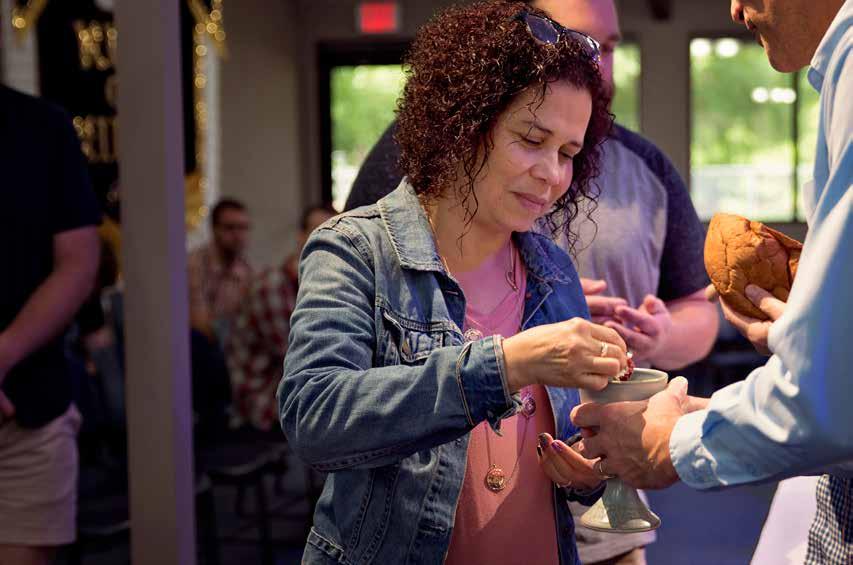
Secondly, are we preparing men to be effective leaders of churches populated by a female majority? The history of machismo has left many scars. Machismo is abrasive or even abusive maleness, similar to toxic masculinity, and this cultural feature seeps into the church. Pastoral leaders need to prepare to work with women in ways that change the patterns ingrained in the Latino culture and work toward healing those scars.
Finally, are we preparing women to be pastors to men while preserving healthy boundaries and relationships? In many cases, women pastors and leaders carry the burden of the tensions between the two genders. So, learning appropriate boundary-setting, having a healthy and balanced understanding of equality, and being mentored by other women can increase female leaders’ effectiveness.
62.9M Latinos/as in U.S.
18% of the population
23M (38%) are Protestants
14M (60%) Women
16M (73%) 49 years old or younger
Incorporating answers to these questions into our curriculum and programs through courses, books, continuing education and mentorship will help Asbury Theological Seminary significantly impact the future of Protestantism in Hispanic America.

THE ASBURY LATINO CENTER EQUIPS WOMEN LEADERS
Asbury Seminary, through the programs of the Asbury Latino Center, is making an important contribution to the future of Protestantism in Hispanic America. Thanks to our gracious and faithful donors, the Programa de Formación Ministerial (LLSP) and the bilingually-delivered Master of Arts in Ministry have almost 50% female enrollment. These women are equipped to expand their leadership roles within their congregations and communities.
However, we need to increase our efforts to ensure that more young Latina women are recruited. It is not a question of representation. It is not a quest for some empty social justice goal. If young Latina women are the future of Protestantism in Hispanic America, then we
need to make sure that more young Latina women are ready to take the mantle of leadership and bring their God-given gifts and unique perspectives to serve the growing Latino/a population in the U.S.
Asbury Seminary is making a critical contribution to the future of Protestantism in Hispanic America. We must sharpen our focus and not let our guard down.
Dr. Danny Román-Gloró is the Director of the Asbury Latino Center. The Asbury Latino Center bridges the Latino community and Asbury Theological Seminary's theological tradition, ethics, mission, and resources. The Asbury Latino Center is focused on helping Latinos(as) become agents of change and leaders within the Kingdom of God and their communities by providing contextually-relevant and theologically-robust educational programs. Danny has a Ph.D. in Communication (Regent University) and a D.Min. in Preaching (Gordon-Conwell Theological Seminary) and is an ordained elder in the Southeast Region Conference of the Free Methodist Church, USA. Before joining Asbury Seminary, Danny was a pastor for 23 years and pastored churches in Miami, Chicago, and Boston.
Spring/Summer 2023 ∙ herald 9
Pastoral leaders need to prepare to work with women in ways that change the patterns ingrained in the Latino culture and work toward healing those scars.
Asbury Seminary Launches Innovative
Seminaries across the U.S. have seen major enrollment declines in the Master of Divinity program over the last two decades. The M.Div. is the gold standard for ministry, yet M.Div. enrollment nationwide dropped 20% from 2006 to 2022. The Master of Arts degree has grown in its stead and now nearly equals M.Div. enrollment.
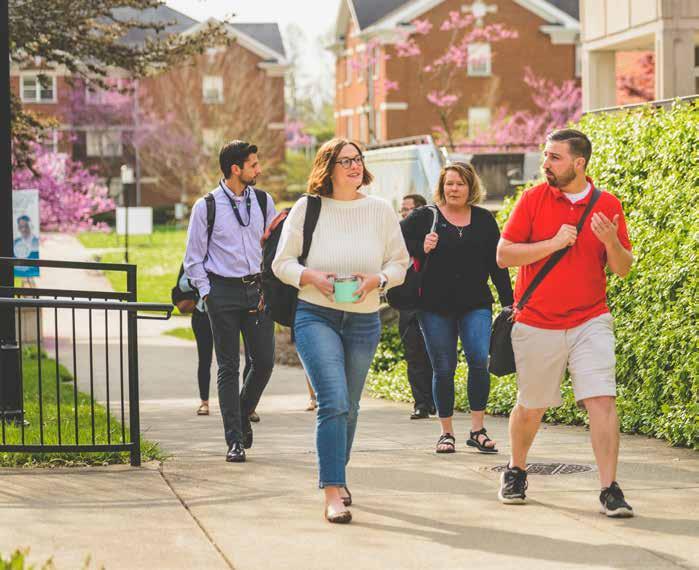
In response, many seminaries have decreased the number of hours required for the Master of Divinity to make it more comparable to a Master of Arts degree. According to the Association of Theological Schools, 50% of theological schools now require fewer than 90 hours to complete the M.Div. (Interestingly, though, M.Div. enrollment has not increased in schools where credit hours have been reduced).
Ministry Leaders Need More Education, Not Less
Our world faces unprecedented challenges. With cultures around the globe connecting via the worldwide web,
the need for contextualized and cross-cultural study and ministry is at an all-time high. At Asbury Seminary, we believe that the 96-credit hour Master of Divinity degree will equip pastors around the globe in a world that is more in need of the true gospel than ever.
Every day, 174,000 people become Christians, yet 85% of evangelical churches worldwide are led by pastors with no formal theological training. In our technological age, constant antagonism and challenges to the Christian worldview come through various media outlets and non-Christian educators and influencers. Ministry leaders need more education, not less. They need to dive deeply into biblical scholarship and Christian theology in order to preach, teach, disciple, and answer complicated questions from an informed perspective.
Increased Value and Affordability
With the Master of Divinity+ launching fall 2023, we hope to revitalize the desire among Christian leaders for theological training as well as make this training attainable. Rather than reduce credit hours, Asbury Seminary
Jenny L. Burkhart, Associate Vice President of Enrollment Services
has added value to the program and simultaneously made it more affordable.
Many prospective M.Div. students are concerned about the prospect of graduating with significant debt. The M.Div.+ at Asbury Seminary is more affordable than ever before. Generous scholarships will be available for M.Div.+ students throughout their degree program. And for those extra credit hours that made the M.Div. more expensive than other theological degrees, Asbury Seminary has innovatively delivered. The M.Div.+ offers free tuition the final year for all tracks, including even the Fast Track (4 Year Plan).
Students taking advantage of this affordability and beginning the M.Div.+ will then receive unprecedented additional benefits.
Unprecedented Benefits
First, M.Div.+ students will be given their own theological libraries online when they receive their free lifetimes licenses to Logos software. Logos is the world’s leading Bible platform with fast access to commentaries, original language tools, reference works, and other biblical resources. With massive networked libraries and professionally designed tools, Logos software enhances the experience of M.Div.+ students and helps them stay focused on their ministry, enabling them to spend less time on research and more time serving the church.
Additionally, M.Div.+ students are invited to join a faculty-led international trip to Israel, Tanzania, Spain, England, Costa Rica, India, or other locations. They’ll each be provided with a $2,000 stipend to help cover air fare and other travel costs. The power of the gospel can manifest more clearly in areas where it is least welcomed. International immersion gives students an opportunity to witness the work of God in the global church abroad and gain a deeper understanding of the diversity of Christianity.
Tailored to Anyone
Some prospective students desire a concentrated season of study, community and spiritual formation. Others need to study at home and desire an online format or an experience that combines the two. Available residentially, online, or in a hybrid format, the M.Div.+ can be tailored to anyone’s circumstances.
Anthropological Studies and Specializations
The M.Div.+ meets the growing need for contextualized study and ministry by including internships and anthropological studies for students’ unique ministry contexts. Furthermore, M.Div.+ students may choose from among many specializations to tailor the program to their unique calling, focus, or setting.

Above all, the M.Div.+ is deeply grounded biblically, theologically, and spiritually, including practices for holiness in the Wesleyan tradition. All students will learn to preach, teach, disciple, and interpret Scripture for their contemporary ministry setting.
The Church of Tomorrow
The M.Div.+ at Asbury Seminary equips students to be fruitful, transformative leaders, spreading the gospel in their many unique contexts around the globe. Students need to be equipped today for the church of tomorrow.
As Asbury Seminary launches the M.Div.+, please pray that the Lord will lead this exciting and valuable initiative for His kingdom.
Jenny Burkhart serves as the Associate Vice President of Enrollment Services at Asbury Theological Seminary. With 25 years of experience in higher education, Jenny strives to provide excellent service to students from the point of admission through graduation.

Spring/Summer 2023 ∙ herald 11
BENEFITS OF THE Visit asbury.to/mdiv-plus for more information
International Immersion Generous Scholarships FREE Logos Software
In 2003, before smartphones were in every pocket and social media platforms became mainstream, microblogs like xanga. com were rapidly growing in popularity. On his Louisiana college campus, a young Chad Brooks watched with interest as people began expressing and living their faith online. During this time, he noticed when Asbury Seminary emerged as the only seminary with an official blog.
“Oh my goodness; it was crazy,” Brooks says.
The blog was called “Web Parish.” Faculty, staff, students and alumni posted short reflections on growing in the knowledge of God.
Brooks was already interested in how spiritual relationships uniquely cohabited online, and the Seminary was having these conversations. Once he found Web Parish, he knew he wanted to engage in a similar ministry.
He enrolled in Asbury Seminary on the Kentucky Campus in 2006.
TWEETING DURING CLASS
Brooks worked toward his Master of Divinity and held a student job at the Chapel Office from 2006 to 2011 while exploring what he calls “cohabitated digital faith.”
“I lived on that leading edge for five years,” says Brooks. His Seminary professors were supportive of his efforts to forge new paths in ministry. For Method and Praxis, Dr. Larry Wood enabled Brooks to start a website featuring articles on eschatology. His other professors also encouraged such experimentations and permitted him to “do all kinds of crazy stuff,” from creating a digitized Scripture journal to tweeting during class.
Upon graduation, Brooks served as a consultant for social media in the Church, an Associate Pastor, and then a Church Planter in the United Methodist Church in Louisiana. Through intentional focus on his local demographic, he grew his church plant to 350 members. Simultaneously, he continued to expand his digital ministry through various platforms.
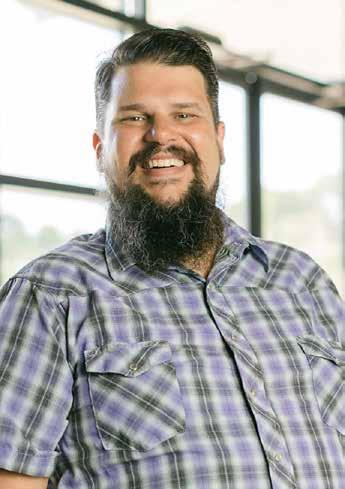
EXTENSION MINISTRY
The covid-19 pandemic was a catalyst leading Brooks to recognize his full calling. In 2022, his official appointment became “Extension Ministry,” which occurs almost entirely online. While many found themselves in uncharted territory during this time, Brooks aggregated everything he had learned through his many years of digital experimentation.
“This is my call. This is who I am,” Brooks says. His ministry is now primarily through his Productive Pastor podcast, YouTube channel, Facebook group, Twitter account, revchadbrooks.com, and his work as a congregation developer and coach through Passion in Partnership.
His podcast, Facebook group, and Twitter account minister to pastors. His YouTube videos reach lay Christians and people wrestling with Christianity, particularly his videos on reading the Bible with a generous approach that’s historically Christian yet doesn’t fall into restrictive interpretations.
DISCIPLED BY A DIGITAL WORLD
Our digital age is a learning curve for churches that are still communicating linearly, according to Brooks. Yet, anyone under 35 is accustomed to running conversations that are relational, like a web. “Think of a rat’s nest. It looks confusing, but it’s strong and stable,” he says of digital relationships. Ultimately, digital ministry is built on relationships and conversations, and tons of them happen through comments to his posts and videos.
Brooks says the “best forward step for pastors is to realize they are pastors online. The person you are online is the person people expect you to be 100% of the time.” To anyone who asks whether online ministry is valid, Brooks points out that our people are already being discipled by a digital world. Digital discipleship is therefore part of the pathway of discipleship for people under 40.
“Prior to covid, people looked at me like I was crazy,” says Brooks.
Now, they would likely agree that being “a United Methodist pastor and misfit” work well together.
ALUMNI HIGHLIGHT
Rev. Chad Brooks Extension Minister, Pastor & Coach Master of Divinity, Asbury Seminary, 2011.
As a professor at the largest evangelical school in Indonesia, Rev. Dr. Daniel Ronda finds himself feeling grateful every day for his Doctor of Ministry from Asbury Theological Seminary.
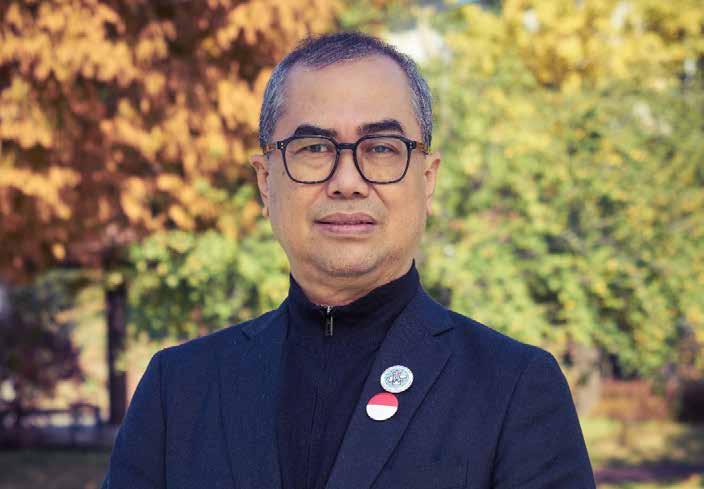
The D.Min. degree had “a great impact on my life because of the teachings; so practical, so helpful, relevant for how to be an effective leader,” Ronda says. “The training and education I have made me confident. I’m so grateful for that because I have a calling to train pastors and leaders.”
Ronda was President at Makassar Jaffray Theological College in South Sulawesi from 2007 to 2016. He is now President of the Christian and Missionary Alliance church in Indonesia, one of the country’s largest evangelical denominations.
YOUNG CONVERTS FROM ISLAM
In the classroom, Ronda trains Christian leaders in a country experiencing phenomenal growth in evangelical Christianity. “This is the Holy Spirit. This is the young people,” Ronda says to explain this growth. According to him, Christianity is growing among the young Generation Z who are converting from Islam because they don’t want to be identified with a radical religion.
Other than Hindus among the Bali Island, Indonesia is predominantly Muslim. The Indonesian government grants freedom of religion. Yet, ISIS as well as Muslims coming to Indonesia from the Middle East have led to growing radicalism and the persecution of Christians, Ronda explains. In some Indonesian rural communities, Muslims bully Christians, close worship services, and even burn house churches.
DRAWN TO CHRIST’S LOVE
Christianity attracts converts for yet another reason. At a 24,000-member church in Jakarta, Indonesia, pastored by Ronda’s friend, hundreds of people regularly come to Christ because they see the love in church communities. They see Christians love people amid difficulties and calamities. “This attracts young people: love. Showing our love. They want to see the love of Christ,” Ronda says. He predicts Indonesia will continue to experience more growth in the coming years through reaching more youth and through diaspora ministry.
HOLISTIC MINISTRIES
Ronda teaches his students about contextual leadership and holistic ministries, which involves learning how to be part of the communities they lead. In Indonesia, there is a wide gap between the rich and the poor, he explains. Holistic ministry means bringing them together.
Yet another contextual challenge in Indonesia is the digital world—a common challenge faced by the global church.
“Churches have to be part of digital communities to reach young people in Indonesia,” Ronda says. “Some pastors don’t feel the need for any more digital, but young people are in digital communities, so we need to reach them. Otherwise, our churches will not be relevant anymore. We have to convince pastors to be online.”
Ronda practices what he teaches. You can find him on Instagram, YouTube, and TikTok, where he speaks to his digital followers about Christian leadership, pastoral issues, church growth, preaching, and the exposition of God's Word.
Spring/Summer 2023 ∙ herald 13
Rev. Dr. Daniel Ronda President of the Christian and Missionary Alliance Church in Indonesia; Professor, Makassar Jaffray Theological College in South Sulawesi Doctor of Ministry, Asbury Seminary, 2007.
ALUMNI HIGHLIGHT
Asbury Seminary hybrid student Pam Harrison takes global ministry to another level: sea level.

Pam and her husband Keith began cruising in the ‘90s with regular week-long cruises in the Caribbean.
On cruise ships, a sea day is when a ship does not dock at a port; therefore, cruisers spend the entire day on the ship. She and Keith thought, “There’s this huge mission field here, and a great need for a Christian community...we are just wasting our time as vacationers.”
As Pam was approaching retirement, God gave Pam and Keith the idea of teaching the Bible on cruise ships. That became their life in 2011. They launched High Seas Ministries, which operates on longer cruises (two weeks to four months) throughout much of the school year.
Now, on sea days, 80 to 150 people come to hear them teach the Bible in a room reserved on the cruise ship.
THE BIBLE IN 10 DAYS
Pam describes High Seas Ministries as interdenominational, reaching primarily older people from various English-speaking countries. Rather than checking denominational traditions at the door, “interdenominational welcomes you to bring your tradition with you.” Some of the participants are nominally Christian and have never read the Bible. “We are here for the lost and the lukewarm, and it is often the lukewarm that reach out to us,” Pam says.
Since long cruises primarily consist of senior adults, Pam and Keith encounter older folks looking for purpose and significance after retirement or who feel they have reached a plateau. “They are kind of coasting. We want to help them get unstuck and see how they can continue to grow in their discipleship,” Pam says.
What brings in these big crowds is Pam’s class, “The Bible in
10 Days.” According to Pam, some people come because they can’t get enough of the Word, and others come from disbelief that she can present the Bible in 10 days. “Whatever gets them there is fine with me,” she says.
Pam and Keith also minister to the crew members, who hail from all over the world. They mobilize their Bible study groups as “missionaries to engage their crew members” through conversations and through materials in a variety of languages from World Missionary Press.
DIVING DEEPER INTO THEOLOGY
During these sea day Bible studies, Pam desired a more rigorous level of personal study. Pam and her spiritual mentor had the same place in mind: Asbury Theological Seminary. Pam’s family life and thriving ministry prevented her from being a residential student. Then, she received an email that the M.A. in Biblical and Theological Foundations had become an online option. She enrolled in 2021.
Pam quickly learned about the Hybrid option. Realizing she wanted a longer degree program, she switched to the Master of Arts in Theological Studies and has studied in Orlando, Wilmore, and Tulsa for Hybrid intensives. “I’m loving it,” she says. “The Bible is so infused into every class, every topic. No matter what class I’m taking… the Bible is there.”
The cruise guests have benefitted, too. “Some questions would come up that I didn’t have the background to respond to,” Pam says. “Now, that’s not the case. Asbury has taught me so much. I can now respond to those questions.”
High Seas Ministries also includes land-based tours in the Holy Land, special events such as Senior Vacation Bible School, and Pam’s podcast “Time Tested.” At the requests of cruise guests, “The Bible in 10 Days” is now available in book and video formats.
PAM HARRISON
Founder, High Seas Ministries
M.A. in Theological Studies, Asbury Seminary, Graduating 2024.
CURRENT STUDENT HIGHLIGHT
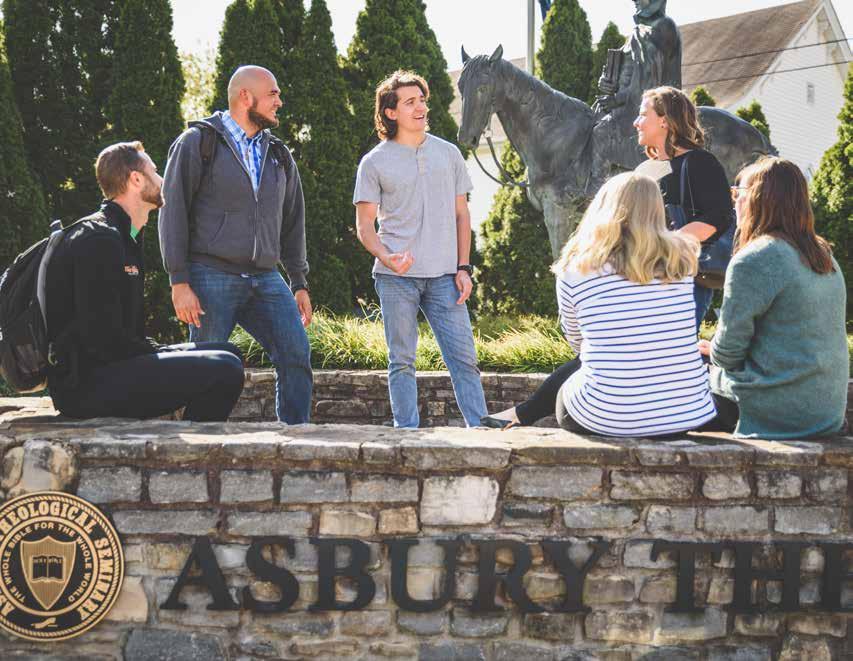
Spring/Summer 2023 ∙ herald 15 When you partner with students, you receive the blessing of their ministries. Make a gift today online. 859.858.2305 | asbury.to/wesleyfund join asbury seminary students in their journeys TOGETHER , we are carrying God’s love to the world.
Certainty in times of uncertainty.
Today more than ever, people need reliability, certainty, and accountability when planning for their financial future. We are all looking for ways to invest that are stable, solid, and firm. For many of us, it means a return to classic financial values and enduring ideals. One of these values is the charitable gift annuity (CGA).*
*A CGA is a simple agreement between you and Asbury Theological Seminary, where you agree to donate a sum of money to the Seminary. In return, we agree to pay you a fixed dollar amount every year for as long as you live
To learn more about charitable gift annuities, visit asbury.to/leavealegacy

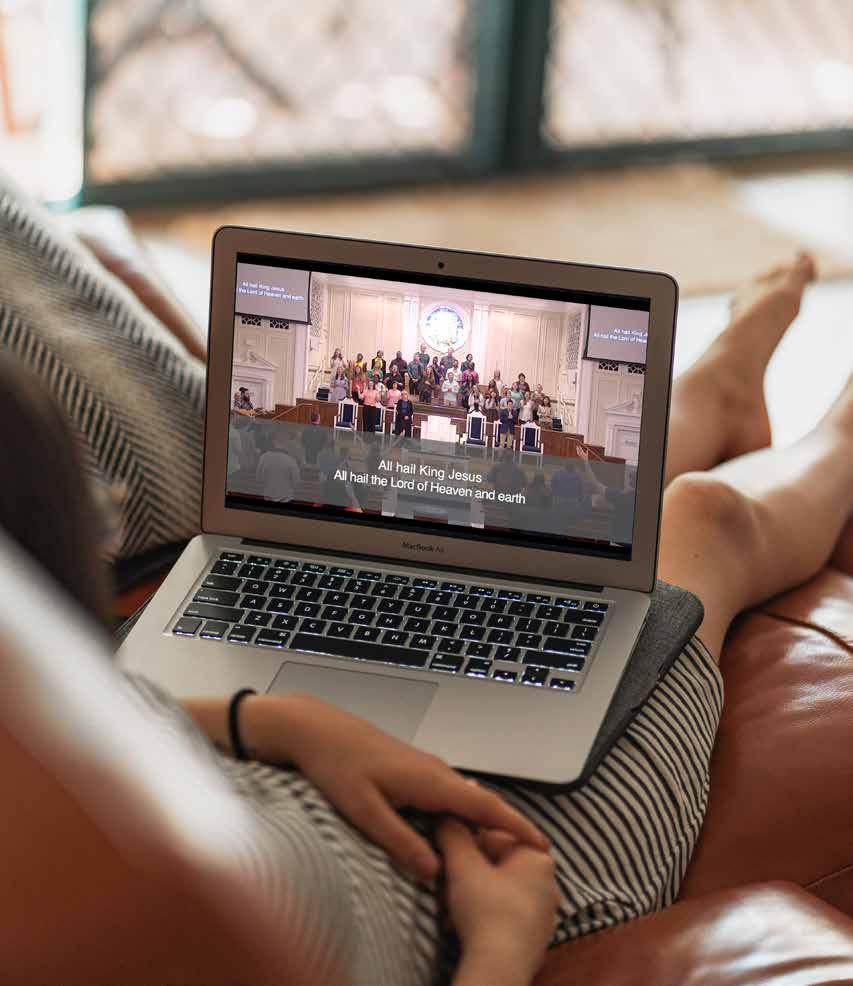
Spring/Summer 2023 ∙ herald 17 Join us for worship, wherever you are in the world. Watch Asbury Seminary Chapel LIVE online every week during the semester at asbury.to/live Visit asbury.to/chapel for our chapel message archive.
Reflections on the Outpouring
DR. THOMAS MCCALL Timothy C. and Julie M. Tennent Chair of Theology
Dr. Thomas McCall shared his perspective for the Asbury Theological Seminary video series “Reflections on the Outpouring”. The following excerpt has been transcribed from his testimony. The Outpouring began in Hughes Auditorium on February 8, 2023, and flowed into event spaces at Asbury Seminary. The Outpouring concluded over two weeks later on February 23.
On Wednesday morning I heard about something unusual that was happening at Asbury University. I've been through a lot of revival meetings and camp meetings, and I'm a bit skeptical of hype and quite allergic to manipulation, but also happy to see the Lord move.
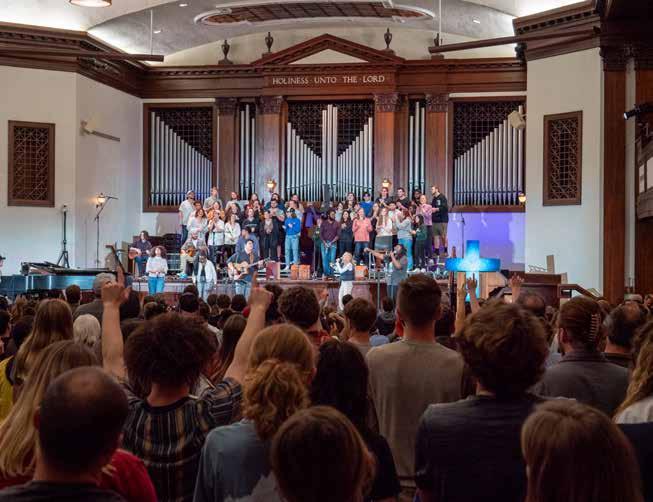
I walked into chapel, just wondering what I would see, and within a couple of minutes I was speechless. People who teach theology for a living are usually not speechless, but it rendered me speechless. The chaplain there, Greg Hasselhoff, greeted me on the side of the platform. I couldn't even talk to him.
I saw students, several hundred students singing softly, many of them with their arms raised in worship. I saw students praying together in small groups. I saw students kneeling at the altar. I saw other students talking together in small groups, joy so evident on their faces.
I didn't want to leave. I stayed there as long as I could on Wednesday afternoon. I came back Wednesday night. I came back Thursday morning, and I found that a small group of students had stayed and prayed through the night.
I came back Thursday afternoon. I came back Friday afternoon. Each time I saw these students, so hungry for God, so alive in God's presence.
I understood immediately why people couldn't wait to get there and didn't want to leave. Students were running to chapel.
I've been around church all my life. My dad was a wonderful pastor. I've been in many, many wonderful environments of worship. I have never seen anything like this. It was a sense of calm serenity, of almost inexpressible joy and hope.
Many of these kids have known political turmoil and fear of disease half their lives. Everywhere there is deep, deep anxiety; hostility and frustration; sometimes outright hatred and venom. And here they walk in this room, and they're surrounded by this deep sense of holy love. They're surrounded by this sense of wholeness and belonging. Of course, they wouldn't want to leave that. This continued through Saturday evening and into Sunday morning.
What God is doing is undeniable. I talked to students
both in and outside of Hughes, students who are already experiencing radical shifts of affection, what they're caring about, what they want to do with their lives, how they want to serve. They are being dramatically transformed.
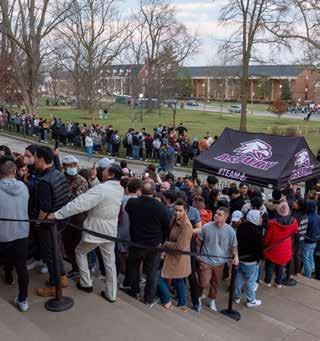
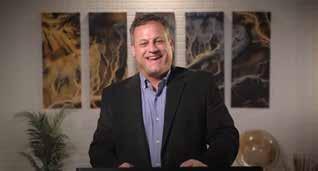
It's just obvious to me God is at work, and there are of course what John Wesley called ordinary means and extraordinary means of grace. This is clearly an extraordinary moment. It doesn't do away with the need for the ordinary. It doesn't do away with the need for word and sacrament.
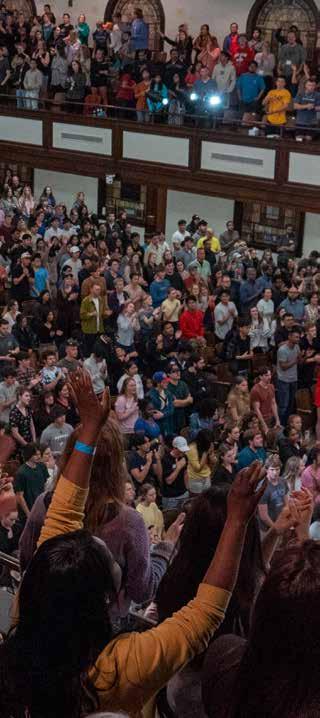
In no way does it replace the long road of obedience, the long road of discipleship. In no way does it discount or displace the importance of disciplined Christian living and joyful service of others. Most of our growth in the Christian faith is in these everyday moments, and it would be a mistake to look to one of these extraordinary moments to replace the ordinary ways that God works.
But wow, should we ever be grateful for the extraordinary!? We just need to recognize it, to celebrate it, to embrace it, to thank God for it.
Click here to see the full video series ”Reflections on the Outpouring“
Spring/Summer 2023 ∙ herald 19
“I have never seen anything like this. It was a sense of calm serenity, of almost inexpressible joy and hope.”
VOICES of the Presidents
I believe there is a great and blessed work ahead for our School of Theology at Asbury College. We shall aim to send out an army of well educated, well trained, Spirit-filled young men, eager on the hunt for souls, giving themselves with intelligence and zeal to the great work of winning the people to saving faith in our Lord Jesus.
-
President
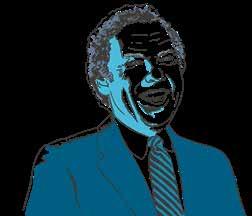
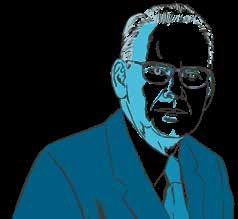

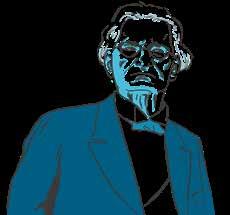 H.C. Morrison
H.C. Morrison
The Pentecostal Herald January 28th, 1925
There is no greater or more rewarding work for the kingdom of God than that of helping to train young men and women in an institution that is Christ centered, Bible centered, and truth centered,
- President J.C.
McPheeters
The Herald, September 19, 1973
Basically our campus is spiritually alive because of our institutional emphasis upon the Holy Spirit. The Wesleyan emphasis has always been ‘a movement of the Holy Spirit.’ The purpose of our seminary is ‘to prepare and send forth a welltrained, sanctified, Spirit-filled, evangelistic ministry.’
- President Frank B. Stanger
Annual Report to the Board of Trustees quoted by J.C.M in Vol 85 No. 5 March 6. 1976
As we think about the Seminary’s role in missions and evangelism today, Francis Asbury still leads the way. Backing up his simple mandate was the motive of sacrificial passion. Showing the way for the circuit-riders whom he recruited, he suffered every hardship that he asked of them-impoverishment, loneliness, sickness and discouragement- for the sake of the gospel. In the name of Jesus Christ, we can do no less today.
- President David
Mckenna
The Herald Fall 1991 Vol 102, #4
Asbury Seminary has been blessed with eight visionary presidents in its 100 year history. Each of our leaders has sought to guide Asbury Seminary with the Holy Spirit's leading and conviction. In doing so, all of our presidents have led with an eye on the future of the institution.
We are constantly being called to do that which will be a failure unless we receive the supernatural power and guidance of the Holy Spirit. We are standing firm and moving forward, guided and empowered by the Holy Spirit. Unless the Lord comes soon, the next chapter of our history will be even richer than the past 75 years. To God be the Glory!
I am committed to leading Asbury, as a servant institution of the church, to continue to be the very first seminary in our tradition. I also believe that our best days are yet to come. We have a great past, but we will not rest on those days. We will use them as a foundation upon which we will build God’s preferred future.

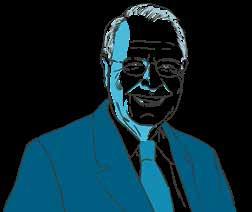
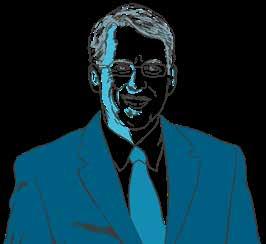
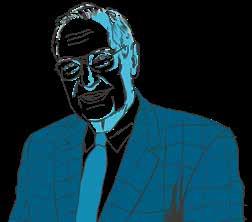
Life is such an ever-flowing stream that there is only a breath between the past and the future, and we call that breath “the present.” What we do with today builds a foundation for the future, or it builds a fence around it. I’m happy to report that Asbury Theological Seminary is working in such a way today that tomorrow, under God, is full of promise.
Of all the challenges we have faced over the last 100 years, and whatever we may face in the next 100 years, the future of this ministry is sitting right here in these chairs and on these lawns. You are the future of this faith. You are the future of this hope. It's because of you that we exist and all the ministries that we can't even imagine now that are before us. Thanks be to God. Great is his faithfulness. Amen.
- President Timothy C. Tennent Address to Asbury Seminary and Asbury University during the Centennial Celebration Joint Worship Service
Spring/Summer 2023 ∙ herald 21
- President J. Ellsworth Kalas Envisioning the Future Volume 118 No. 3 Fall 2008
- President Maxie D. Dunnam The Asbury Herald 75th Anniversary Commemorative Issue
- President Jeffrey E. Greenway The Asbury Herald 2004 Inauguration Issue Winter 2005
News & Events
New History of Asbury Seminary Published

As part of Asbury Seminary's centennial celebration, Dr. J. Steven O'Malley's new book, "For the Whole World: A Century of Mission at Asbury Theological Seminary", explores the seminary's history in depth, showing how Asbury Seminary remains faithful to the mission for which it was founded. Dr. O'Malley traces the challenges and successes of each administration, as well as telling the stories of members of the Board of Trustees, faculty, staff, students, donors, and, especially, alumni.
Asbury Seminary Welcomes New V.P. of Formation

The Reverend J. Matthew Barnes, Ph.D., is the Seminary’s new Vice President of Formation. He arrived in early September with over two decades of experience as a pastor, missionary, and academic. Drawing from a wide variety of gifts, talents, and expertise, Dr. Barnes is passionate about preaching, leadership, training, leader development, and pastoral care and counseling.
Congressional Honor for Asbury Seminary
In September 2022, Senator Mitch McConnell read to the Senate a congressional honor of the 100th anniversary of Asbury Seminary. He asked his colleagues to join him in honoring “this renowned Kentucky institution” and “its outstanding contributions to our Nation’s spiritual strength” and in wishing for its continued spread of scriptural holiness throughout the world.
Follow us on social media for the latest news, events, and content from Asbury Seminary.
Global Methodist Church Announces its Recommendation of Asbury Seminary
The Global Methodist Church has announced Asbury Theological Seminary as a recommended educational institution. “We share a vision with the Global Methodist Church to bring the Good News of Jesus Christ, and it is a sacred privilege to serve the Church by equipping men and women to answer that call,” said Dr. Timothy C. Tennent, President of Asbury Seminary.
Rev. Dr. Matthew Porter Consecrated the Bishop of Bolton
The Reverend Dr. Matthew Porter, alumnus of Asbury Seminary, will be consecrated the Bishop of Bolton in North West England in June. An author and father of five, he is passionate about evangelism and discipleship and in serving the youth and those in poverty. He believes prayer is foundational to renewal movements, the topic of his 2022 Doctor of Ministry dissertation.

Please join President Timothy C. Tennent as he shares the Asbury Seminary vision in your area. At each of his stops, Dr. Tennent is honored to be speaking at Sunday morning services.
Upcoming Dates:
September 8-10, 2023
Asbury Church, Tulsa, OK
For event schedule, reservations, and information, contact Major Events: 877.PRAY.ATS (772.9287) or email, major.events@asburyseminary.edu.
CELEBRATING 100 YEARS OF MINISTRY TOGETHER
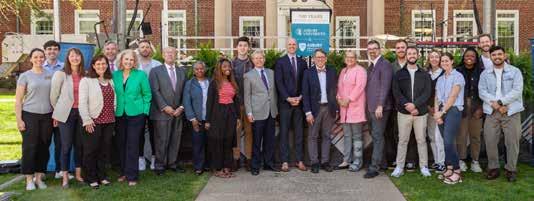
On April 19, Asbury Seminary hosted a Joint Worship Celebration with Asbury University on Lexington Avenue as part of the Seminary's Centennial Celebration. This service commemorated H.C. Morrison’s founding of Asbury Seminary while he was president of Asbury College. The presidents of both institutions, Dr. Timothy C. Tennent and Dr. Kevin Brown, gave inspiring messages, and Bristol House led powerful times of worship. President Brown presented President Tennent with a gift honoring the Seminary's Centennial: an early-1900s oil painting of H.C. Morrison by famous painter Paul Plaschke of Louisville. Trees, symbols in the Bible of life and growth and strength, were gifted to each institution. Rev. Dr. Matt Barnes presented an October Glory Maple to Asbury University, and Dr. Sarah Baldwin presented a Wildfire Black Gum to Asbury Seminary. To watch the full service, visit asbury.to/archive
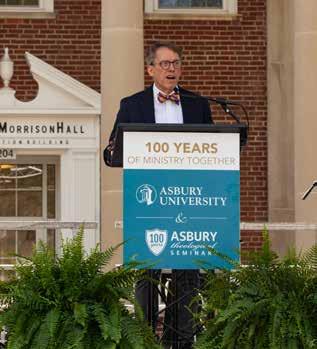
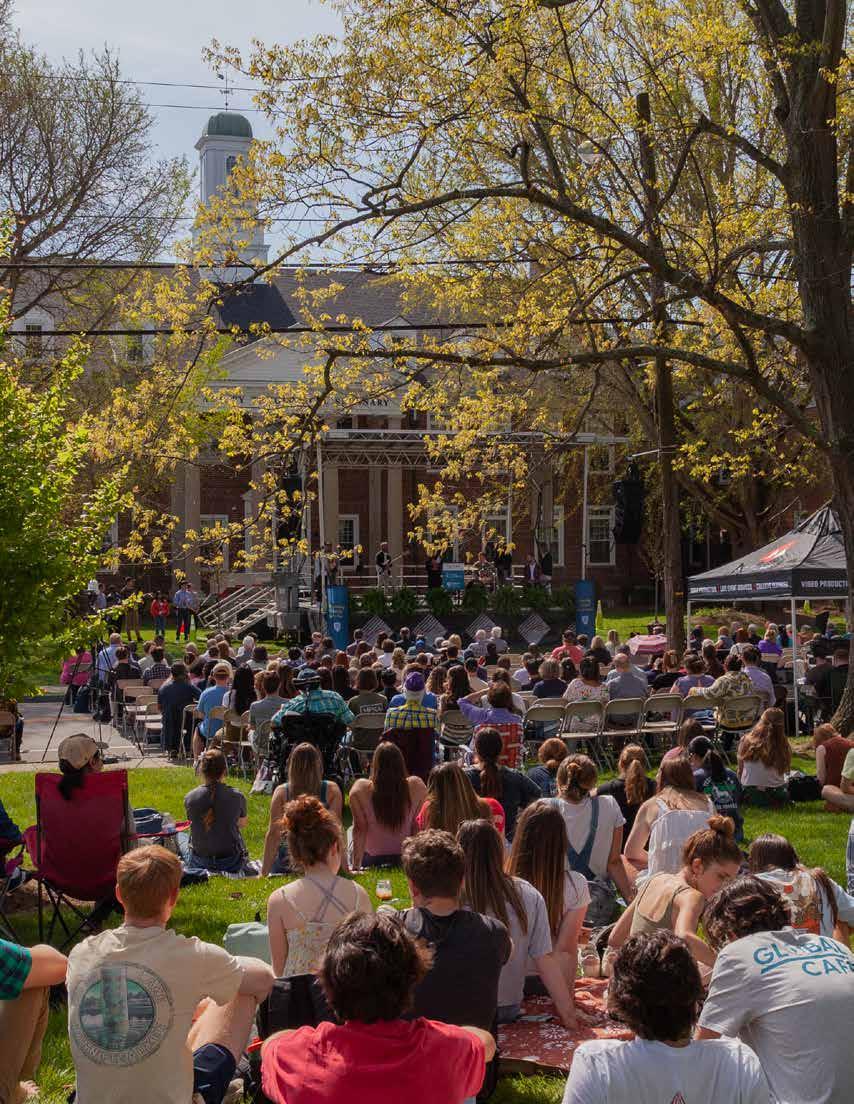
What if you could be prepared for anything?
Our 96-hour Master of Divinity+ (M.Div.+) degree equips you to be a transformative leader who effectively spreads the Gospel wherever God has called you.

Learn more at asbury.to/mdiv-plus.

204 North Lexington Avenue Wilmore, Kentucky 40390 asburyseminary.edu 800.2ASBURY













 by Dr. W. Jay Moon
by Dr. W. Jay Moon



















 H.C. Morrison
H.C. Morrison











